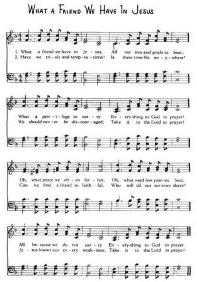What a Friend We Have in Jesus

A Christian religious service seems incomplete without a hymn, and weddings are no exception.
This page is about the most popular hymn at a Western-style wedding in Japan: What a Friend We Have In Jesus.
But why is this song, with its miserable associations with death, illness and war, so popular for a wedding?
What a Friend We Have in Jesus
In Japan twenty-three million people (20% of the population) sing this song every year making What a Friend We Have In Jesus Japan's most popular song. Just think of the royalties an author might get for such popularity.
But who was the author?
Joseph Scriven
Irishman Joseph Medlicott Scriven was born in 1819 and graduated from Trinity College, Dublin.
Things seemed to be going well - he fell in love with a young woman and they planned to marry.
But tragedy struck. The evening before the wedding, his bride drowned.
Following this, Joseph moved to a teaching post in Port Hope, Canada, but sadness followed him. He again became engaged and once more, just before the wedding his bride became ill and died.
In 1855 his mother in Ireland also became ill and to encourage her, he wrote the following poem entitled 'Pray Without Ceasing'. (We were unaware of this title until contacted by Joseph's younger sister's great-great-granddaughter, Katie. You can see Katie's blog at katiescrivenhall.blogspot.com)
What a Friend we have in Jesus, all our sins and griefs to bear.
What a privilege to carry, ev'rything to God in Prayer.
O what peace we often forfeit, O what needless pain we bear,
All because we do not carry, ev'rything to God in Prayer.
Have we trials and temptations? Is there trouble anywhere?
We should never be discouraged; take it to the Lord in prayer.
Can we find a friend so faithful, who will all our sorrows share?
Jesus knows our every weakness; take it to the Lord in prayer.
Are we weak and heavy laden, cumbered with a load of care?
Precious Saviour, still our refuge, take it to the Lord in prayer.
Do thy friends despise, forsake thee? take it to the Lord in prayer;
in his arms He'll take and shield thee, thou wilt find a solace there.
Blessed Saviour, Thou hast promised, Thou wilt all our burdens bear
May we ever, Lord, be bringing, all to Thee in earnest prayer.
Soon in glory bright unclouded, there will be no need for prayer
Rapture, praise and endless worship, will be our sweet portion there.
Such words would be easy for Joseph to write; he knew sorrow and pain. His whole life had been devoted to caring for the sick and needy. But in the end it all became too much; his spirit and finances went into steep decline.
Late one night, 10 August 1886, poor Joseph was deeply depressed. He was left alone whilst a friend stayed in an adjoining room. Later, when the friend went to check Joseph was all right, he was surprised to see the room empty. A search was made but it wasn't until the middle of the next day Joseph's body was found, lying in some water. To this day, we do not know if his death was an accident or suicide.
Ira Sankey
Shortly before his death the poem was found by Ira David Sankey who added music written in 1868 by Charles Crozat Converse.
Charles C Converse
Converse named the melody Erie, after the port town in Western Pennsylvania.
Coincidentally, Erie is now the home port of the Brig Niagara, which is the reconstructed flagship of Commodore Oliver Hazard Perry. Oliver's brother, Commodore Matthew Calbraith Perry (1794-1858), commanded the expedition that established United States relations with Japan. Ever since the 17th century, Japan had been closed to outsiders, and this opening was in the same year that Scriven wrote his poem.
Tom, Dick and Harry
The hymn was born and quickly became popular in church services throughout the world, and particularly in Britain.

Unknown soldier
1914-1918
Some years later, during the Great War of 1914-1918 (you know; WWI, which was supposed to end all wars for ever, but only did so for those who died: 1,800,000 Germans, 1,700,000 Russians 1,400,000 French, 1,200,000 Austro-Hungarians, 800,000 British, 650,000 Italians, 340,000 Romanians, 320,000 Turks, hundreds of thousands from other countries, three times as many wounded... With the uncertainty of knowing their future, the hymn was a popular spirit-lifter in British troop church parades from Gallipoli to the Somme.
Easy to sing, easy to accompany on a harmonica, and comforting lyrics for the millions of soldiers in the trenches. It's not hard to imagine Tommy whistling the tune as he plucked up courage to eat his mysterious army rations, and it was not long into the war before alternative words were penned:
When this bloody war is over, O how happy I will be;
When I get my civvy clothes on, no more soldiering for me.
...(the rest is a bit too bawdy for these pages)
These words were adapted by British singer Bob Davenport in the late 1960's for an anti-Vietnam war song.
But wartime songs were not the only words using this melody. The simplicity of metre plus the popularity of the hymn led to it being tailored for countless other songs. Here are the first lines of just a few:
What a Friend We Have in Hoover
(by Tom Paxton, about Director of
the FBI J. Edgar Hoover's obsession
with Martin Luther King)
What a friend we have in cheeses
(by an unknown American writer)
What a Friend We Have in Willy
(by Hilda Thomas)
What a Friend We Has in Rhoda!
(by Dick Greenhaus, about a
notable figure in a labour dispute)
At just about every school in England, children (including Yours Truly) would make up derogatory verses about their most loathed schoolmaster or prefect, and sing it quietly while the rest of the school sang the original words during the morning school assembly service.
The ghosts of Scriven and Converse would probably not have been very amused by any of this but they surely would have approved of Elvis Presley's version sung during a Las Vegas concert and recorded on 28 August 1973.
Ohio
A world away from Las Vegas - about 2,000 miles to the East - is Ohio, home to a sizable community of Amish.

Amish, as we all (think we) know, live plainly, are pacifists, ride in buggies and separate themselves from modern trappings such as the internet. They’re not keen on Social Security and shun electricity. But far from living in the Dark Ages; they read voraciously and live very enlightened lives.
A popular hymn for some communities is 'Wo Ist Jesus Mein Verlangen', often sung to the tune of 'What a Friend We Have In Jesus'. The translation from German reads:
Where is Jesus, my desire
Where is Jesus, my desire
My beloved Lord and friend?
Where has He gone
Where can He be found?
My soul is very grieved
With many sins
Where is Jesus my beloved
Who cares for us day and night?
Oh, I call because of fear and pain
Where has my Jesus gone?
No rest is in my heart
Until I am near Him.
Oh, who will give me wings of a dove?
So that I can at any time
Fly over mountain and hill
And seek where my Jesus is.
See the Amish page for the original words and a bit more on this.
'What a Friend We Have In Jesus' has not been restricted to Western and Christian cultures.
Indonesia
In Indonesia, the hymn is known as Yesus Kawan Sejati and is sung in Bahasa or Batak (the indigenous language of North Sumatra) in Protestant churches (around 6% of the population). The majority of Indonesians are, of course, Muslim (around 86%) and consequently the hymn is not widely known. However, many years ago (probably prior to when Suharto seized power in 1967) the same music was adopted for a popular patriotic song entitled Ibu Pertiwi. In English, the translation is roughly:
I saw our Motherland, wrapped in sadness.
Her eyes welled with tears, remembering her lost treasures.
Forests, mountains, rice fields, oceans. Her reserves of wealth.
Now Mother is sorrowful. Crying softly and praying
The author of the words is unknown and usually the words and music are attributed to 'anonymous'.
What a Friend - Indonesian page
Japan
Around 100 years ago, the tune was applied to a children's Japanese folk song, Hoshinoyo, written by Daisui Sugitani. Born in 1874 in Tottori, he moved to Tokyo to study but had to give up his work due to illness. He died at the age of 40. (With Joseph Scriven's sad life, short-lived fiancés, and his mother's sickness, the toll for this song is mounting!)
Around 100 years later, the following English composition to the same music:
Stars in Heaven
Translation by James Warren (2005)
Moonless night is now upon us, yet the sky is full of light.
How enticing are the stars now, like a dream that sets us right.
Wisdom permeates the night sky, riding every beam of light.
Let us use our clearest minds then, with our noblest goals in sight.
Cloudless sky of evening's darkness, showing off our Milky Way.
Glory Glory Hallelujah, home's more grand than we can say.
Awe struck now we stare and wonder, are they truly far away.
In a star light so eternal; find the truth to light our way.
The original What A Friend We Have In Jesus is still popular today, so much so that the song has been adapted to Western-style wedding ceremonies in Japan. At first sight, it seems strange to sing this song at weddings since it has miserable associations with death, illness and war. But married life, as many of us know, often encounters grief and pain, trials and temptations, trouble and sorrow.
Just before a wedding, couples are naturally apprehensive, indeed often terrified, of the unknown life before them. This hymn, therefore, can be a measure of comfort to know that if such problems arise, they can "take it to the Lord in prayer".
The music is the same and Joseph Scriven's original poem, written to his bedridden mother in Ireland 150 years ago, is translated as Itsu ku shimi fu kaki.
The melody
Here's a boogie-woogie version. We're not suggesting that version's suitable for a wedding, but it's rather cute and we feel it should get more listened to. It was performed by 'God's Gospel', and we're putting it here without their permission. If anyone has contact details for 'God's Gospel', please let us know!
Here's another on another on Youtube
Terry R Shaw, (of 'Terry Tunes' fame) has put the words to an alternative melody; that of Bette Midler's "the Rose". Terry performs in nursing homes every day and this is one of the versions that the residents love. Listen to his sweet voice on this audio track and at the same time, read much more about What a Fiend in Jesus on his YouTube video.
There's a more upbeat singalong version here.
If you have further information about this song, please email us and we'll add it to this page.
Yes, we've counted them
Some insist the spelling should be 'grieves', but 'grieve' is a verb, so we're sticking with the spelling 'griefs'
Source: The Longman Companion to the First World War, Colin Nicholson, Longman 2001, p248
